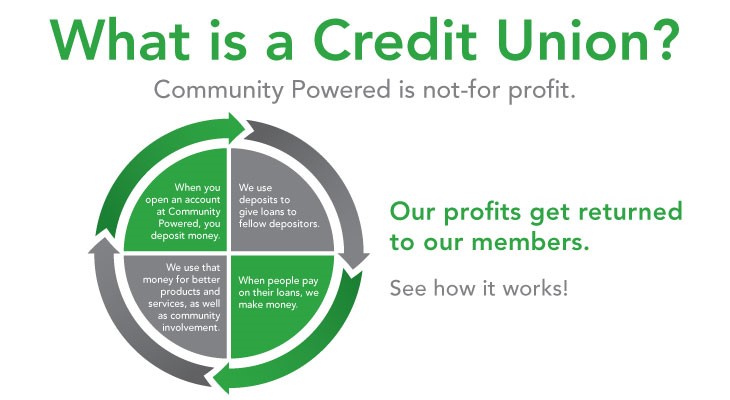Credit Unions in Wyoming: Comprehensive Financial Solutions and Member Perks
Credit Unions in Wyoming: Comprehensive Financial Solutions and Member Perks
Blog Article
The Ultimate Overview to Recognizing Lending Institution
Credit rating unions stand as unique monetary entities, rooted in principles of mutual assistance and member-driven operations. As we navigate through the details of credit history unions, an insightful journey awaits to shed light on these member-focused organizations and exactly how they differ from typical banks.
What Are Credit History Unions?
Credit report unions are member-owned economic institutions that provide a variety of banking services to their members. Unlike traditional financial institutions, credit history unions operate as not-for-profit organizations, implying their key emphasis is on offering their members instead than taking full advantage of revenues. Members of a credit scores union normally share an usual bond, such as functioning for the very same employer, coming from the same neighborhood, or belonging to the exact same organization.
One of the key advantages of cooperative credit union is that they typically provide greater interest prices on interest-bearing accounts and reduced interest rates on finances contrasted to banks. This is because debt unions are structured to benefit their members directly, permitting them to pass on their incomes in the kind of better prices and fewer costs. Furthermore, lending institution are understood for their customized customer support, as they prioritize constructing relationships with their participants to understand their special economic needs and objectives.
History and Development of Lending Institution

The roots of member-owned financial cooperatives, known today as lending institution, trace back to a time when communities looked for choices to standard banking organizations. The principle of credit report unions come from the 19th century in Europe, with Friedrich Wilhelm Raiffeisen typically credited as the pioneer of the cooperative financial movement (Cheyenne Federal Credit Union). Raiffeisen started the initial identified credit history union in Germany in the mid-1800s, emphasizing neighborhood assistance and self-help principles
The advancement of cooperative credit union proceeded in North America, where Alphonse Desjardins developed the very first cooperative credit union in Canada in 1900. Shortly after, in 1909, the very first U.S. lending institution was developed in New Hampshire by a team of Franco-American immigrants. These very early credit history unions operated on the essential concepts of shared aid, democratic control, and participant possession.
Gradually, credit rating unions have actually expanded in popularity worldwide as a result of their not-for-profit structure, focus on offering members, and using affordable financial product or services. Today, credit history unions play a vital role in the monetary sector, providing easily accessible and community-oriented banking choices for businesses and individuals alike.
Membership and Qualification Standards
Membership at a credit rating union is typically limited to people satisfying specific qualification criteria based on the establishment's beginning concepts and regulative needs. Some credit score unions may only offer individuals that live or function in a certain location, while others may be customized to employees of a certain firm or members of a certain association.
Furthermore, lending institution are structured as not-for-profit companies, implying that their main objective is to serve their members instead than produce profits for shareholders. This focus on member service commonly equates into even more personalized interest, lower fees, and affordable rate of interest on loans and financial savings accounts. By satisfying the eligibility requirements and coming to be a member of a debt union, individuals can access a series of monetary products and solutions customized to their certain needs.
Providers and Products Supplied
One of the key aspects that sets credit report unions apart is the diverse array of financial solutions and items they use to their participants. Credit score unions normally supply typical financial services such as cost savings and checking accounts, financings, and credit scores cards.
Additionally, lending institution commonly provide hassle-free online and mobile banking options for members to quickly handle their funds. They may offer benefits such as common branching, enabling participants to access their accounts at other cooperative credit union throughout the nation. Some lending institution also supply insurance policy items like home, vehicle, and life insurance policy to assist members safeguard their assets and loved ones.
In addition to economic solutions, lending institution frequently participate in community outreach programs and financial education and learning campaigns to sustain their participants in accomplishing their monetary objectives.
Benefits of Financial With Credit Score Unions
When taking into consideration monetary organizations, discovering the advantages of financial with cooperative credit union reveals special advantages for participants seeking customized service and competitive rates. One substantial advantage of credit unions is their concentrate on individualized customer support. Unlike large financial institutions, cooperative credit union are member-owned and prioritize building solid partnerships with their participants. This implies that cooperative credit union team frequently have a much deeper understanding of their participants' financial needs and can supply tailored remedies to help them accomplish their objectives. Additionally, lending institution are Hybrid Line of Credit known for using affordable rate of interest on loans and financial savings accounts. Due to the fact that they are not-for-profit companies, debt unions can commonly supply lower lending prices, higher cost savings rates, and lower costs contrasted to typical banks. This can lead to substantial expense financial savings for participants in time. Generally, financial with a cooperative credit union can provide a much more customized, economical, and member-centric financial experience.
Conclusion

Credit score unions are member-owned economic institutions that supply a variety of financial services to their members. The concept of credit report unions stem in the 19th century in Europe, with Friedrich Wilhelm Raiffeisen often attributed as the pioneer of the participating financial movement.The advancement of debt unions proceeded in North America, where Alphonse Desjardins developed the first credit union in Canada in 1900. Credit scores unions generally give standard banking solutions such as financial savings and inspecting accounts, fundings, and credit scores cards.When considering economic institutions, exploring the benefits of banking with credit unions exposes unique advantages for members seeking personalized service and competitive prices.
Report this page